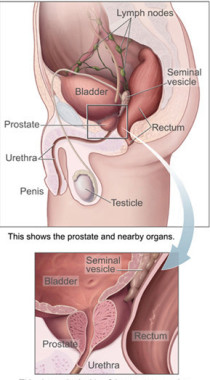The prostate gland
A healthy human prostate is classically said to be slightly larger than a walnut. In actuality, it is approximately the size of a kiwifruit The mean weight of the "normal" prostate in adult males is about 11 grams, usually ranging between 7 and 16 grams.
It surrounds the urethra just below the urinary bladder and can be felt during a rectal exam.
The function of the prostate is to secrete a slightly alkaline fluid, milky or white in appearance,that usually constitutes 20–30% of the volume of the semen along with spermatozoa and seminal vesicle fluid. The alkalinity of semen helps neutralize the acidity of the vaginal tract, prolonging the lifespan of sperm. The alkalinization of semen is primarily accomplished through secretion from the seminal vesicles. The prostatic fluid is expelled in the first ejaculate fractions, together with most of the spermatozoa. In comparison with the few spermatozoa expelled together with mainly seminal vesicular fluid, those expelled in prostatic fluid have better motility, longer survival and better protection of the genetic material (DNA).
The prostate also contains some smooth muscles that help expel semen during ejaculation.


